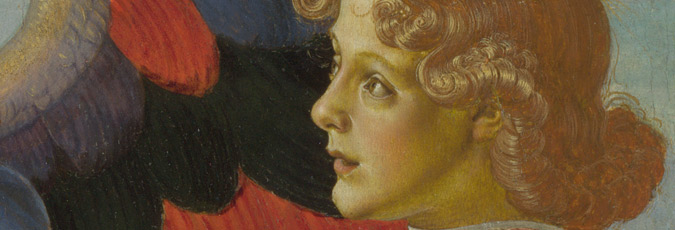Watch a storytelling performance by a Year 6 pupil at Sherington Primary School and read the teacher's view on the high quality of writing the project produced.
Storytelling: 'Tobias and the Angel'
Transcript
A Year 6 pupil from Sherington Primary School performs his version of 'Tobias and the Angel', as part of the Out of Art into Storytelling project
Sherington Primary School pupil:
It happened one afternoon. Tobit was dozing under a fig tree. Along came a sparrow and landed at his cheek. It rapidly started pecking at his eyes, and when the bird flew away, his eye started to swell. But as the swelling faded, so did his eyesight.
In one week, Tobit was blind. Tobias saw his father stagger, across room to room, talking crazily to himself. And his mother forced him to do work. Every penny counted and every penny was harder to come by. The days went by like rabbits and in a couple of weeks they were poorer than a rat's larder.
But Tobit remembered that he lent some money to an old friend in Media, Persia. He sent Tobias to fetch the money, but with a journey that long, with big deserts and mountain ranges, it would be dangerous on his own.
So he marched to the market and he asked all the tribesmen, would they come with him. But they backed away. They'd heard of Tobit’s blindness and they were afraid they’d maybe catch the disease. In the end, a lone tribesmen was sitting on his own near the fountain. He caught Tobias's eye.
"My name is Raphael, and I'd love to come with you," said the tribesman, standing.
So Raphael and Tobias set off on their journey across the ancient paths, accompanied by Tobias’s dog, Hero. Every evening, they would find a place under the stars to sleep in, while Hero chased the crows and played with the rabbits.
One evening they came to an enormous river. "Tomorrow we will cross this", said Raphael. So they dozed under the stars.
The next morning, Raphael led the way across the river, with Tobias behind, holding his grip with an enormous stick. But Tobias got scared while the water rose, and he was frightened that the water might swallow him.
Suddenly something swooped under his legs and made Tobias lose his balance. A huge fish rose, mouth open, ready to eat him.
"Use your stick!" bellowed Raphael. So Raphael grabbed his stick and whacked it across the fish. Tobias grabbed the fish and hoisted it onto the bank.
While Tobias grabbed his breath, Raphael stared at him. Tobias stared back at Raphael for reassurance.
"Why did you not help me?"
"You only lost your balance," said Raphael. So they marched on to their journey.
When they arrived at Media, Persia, straight away Raphael rushed to get the money that was owed to Tobit. But Tobias just laid out in the sun, looking at all the people doing their business.
Then a girl called Sarah, about his age, caught his eye. As soon as he went over, they started chatting. But as Raphael came back, he was already head-over-heels in love.
They stayed there for seven months, enough to woo and wed Sarah. Sarah sought out Raphael and confessed her story. There was an evil demon called Asmodeus, sworn to kill anybody who married her. Already, in the graveyard, there were six fresh graves. Raphael told them, we will use the fish's scales to burn the fish's entrails when we're alone.
So as the moon came up and the lights went out, but only the starlight in the stars, they burned the entrails. And they could hear Asmodeus plodding outside.
Hero barked as the smoke rose into the building and then out the window. Asmodeus paused, sniffed the smoke in. He froze, and he started to shrink, very slowly, until he was dust in the breeze. And they cheered.
And they stayed in Media for many more months, until they arrived at the town where his father lived over the years. They heard the father calling for his son: "Tobias, you may now use the fish's eyes." So Sarah mashed up all the eyes. Tobias rubbed his hands in them, sat down next to his father and rubbed them into his eyes.
As the milky paste fell: "I can see," said Tobit.
"Indeed you can."
But maybe he could see better than Tobias and Sarah, because when he looked at Raphael he didn't see the tribesman who helped him for many miles. No, he saw a man with a light. Or could that just be the sun? No, he saw a man with glimmering silver wings. Or maybe because he was so blind for so long. As the light went, so did Raphael.
"Now I can see," chuckled Tobit.
Year 6 teacher Monica Lanata
"The impact of using visual stimuli such as paintings in order to grab the children's attention and improve the quality of their writing is just amazing! The children's imagination came alive with the paintings – they lived and breathed the scenes that were shown, and this enthusiasm showed when it came to writing.
"Using storytelling as a starting point for their writing was very useful as well, as it allowed the children to take ownership of their stories and to practise constructing their ideas before committing them to paper. This meant that even the least confident of the children felt they were ready (and willing) to write at length, and it gave them a chance to practise the 'story voice', which makes their writing much livelier to read."
The main impact on children
Benefits included:
- Confidence – knowing the story through drama and storytelling meant it was easier for the children to be successful when writing it down
- Enjoyment – writing became a 'fun' activity, not just another task to complete at school
- Equal starting points – studying the paintings and creating a story as a class meant that every child was benefiting from the sharing of ideas, and that they were all starting at the same point when writing
Main impact on teaching
Benefits included:
- Pride – it was fantastic to see the children achieving such high levels of writing with such ease
- Enjoyment – lessons were fun for all, not just the children!
- Cohesion in planning – the paintings led the way, not just for planning a literacy unit on writing stories, but also for linking other subjects and literary genres

